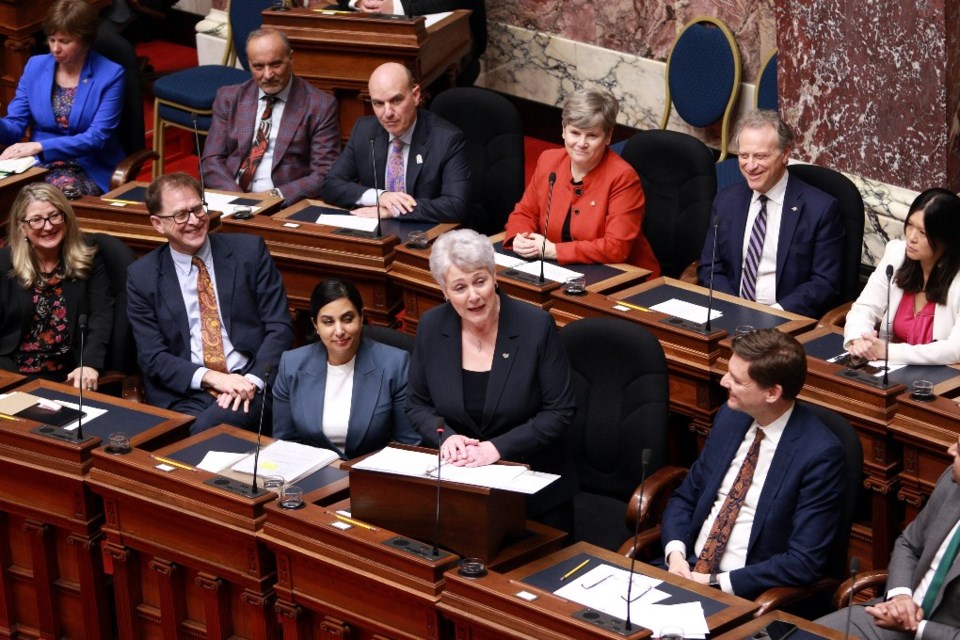B.C. is doubling down on its fight against real estate speculators, proposing a far-reaching anti-flipping tax on the heels of a tirade against investors in this week’s throne speech.
“Budget 2024 will bring in the new B.C. home-flipping tax,” B.C. Finance Minister Katrine Conroy told the legislature, Feb. 22. “If a home is sold within two years of purchase, the profit will be taxed, and the revenue will go right back into building middle-class homes for people.”
The province says it will introduce legislation through the budget implementation bill in early spring 2024. The tax will be levied on proceeds from the sale of residential real estate held for less than two years, both those with existing housing units and those zoned for residential use.
Proceeds from the sale of purchase contracts for unbuilt units – presale assignments – will also be taxed.
The tax rate will be 20 per cent for properties sold within 365 days of purchase and will decline to zero for those held between 366 and 730 days.
The province says the tax will apply to properties sold after Jan. 1, 2025; this means properties since Jan. 1, 2023 will be vulnerable to the tax if sold within two years of purchase in 2025.
The province says various exemptions will be provided, including divorce, death, illness and relocation for work, among others.
However, the BC Real Estate Association is concern at the broad definition of flipping, which is typically deemed to be a sale within six months of purchase with the aim of capturing a profit.
“The definition of a flip as any transaction occurring within two years is certainly not conventionally how flipping is defined,” BCREA chief economist Brendon Ogmundson said.
While flipping can be harmful by accelerating over-heated markets, it is typically a limited and short-term phenomenon – at least in Vancouver and Victoria.
Ogmundson pointed to Bank of Canada research indicating that sales within six months account for less than 1.7 per cent of residential transactions, while sales within 12 months of purchase account for just three per cent.
He expects that most sales after a year of ownership would qualify for one of the government’s proposed exemptions.
“The tax is unlikely to have much impact,” he said, noting, “It's also being levied on top of two other existing taxes in most cases – a capital gains tax on the sale of a non-primary residence and an existing federal anti-flipping tax.”
Ogmundson also suggests the tax could have an unintended impact by delaying some sales and keeping inventory off the market.
“There will be some potential sellers that are prompted to delay listing, resulting in a lower level of listings inventory than without the tax and tighter market conditions,” he said. “As a result, it is entirely possible that home prices would be higher with the flipping tax than with a no-tax baseline.”
However, the BC NDP seem intent on stamping out anything that smacks of profit in residential real estate.
Lt. Gov. Janet Austin, in delivering the throne speech on Feb. 20, used language also deployed in Conroy’s budget announcement to declare a war on those who would profit from housing.
Calling out “those who take unfair advantage by putting profits ahead of people,” Austin said the government “will always go after bad actors, whether they're dealing in real estate, money laundering, organized crime and more.”
With comparisons like that, real estate investors, developers and housing providers generally may well wonder if they’re welcome in B.C.
The new anti-flipping. tax follows a host of other measures designed to crack down on real estate speculation in B.C., including a continually expanding speculation and vacancy tax and tough new rules on short-term rentals.
Presale assignments were subject to tighter controls in 2018 as part of the BC NDP's initial salvoes against real estate speculators.
The BC NDP also increased the foreign buyer tax the BC Liberals introduced in 2016.



